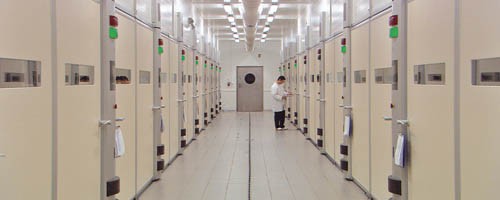Examining our food -- where it came from, exactly how it got to us and at what costs -- is currently a trendy sub-set of pop culture. We've read The Omnivore's Dilemma and Fast Food Nation; caught the exposes on NPR and television; and flipped through dozens of articles. Now Austrian filmmaker Nikolaus Geyrhalter offers Our Daily Bread, a contemplative film essay that unflinchingly shows us the truth about what we eat.
Geyrhalter shot throughout Europe -- in fish farms, dairies, salt mines, greenhouses, slaughterhouses and orchards. There's no explanatory titles or voiceover. Geyrhalter is simply an observer, a conduit. The camera remains still, traveling only in tracking shots when passively hitching a ride on machinery. The soundtrack is simply the hum of the machinery, the chorus of animal grunts and peeps, the odd word of an employee, and silence.
Geyrhalter leaves the camera running well past when we've grasped what's occurring (though some actions and scenes remain mysterious), freeing up our mind to pace through its own commentaries. While Geyrhalter's agenda is to enlighten, his film is largely non-judgmental. A proponent of mega-agriculture might view Bread as an especially artistic industry promo film.
The images range from surreally beautiful (spectral greenhouses that glow eerily in the night) to the comic (if you're a factory chicken, your destiny is to be frequently vacuumed up) to the icky. The slaughter of animals is depicted frankly, though in a fairly clinical setting.
I found it more unnerving to realize that what amounts to robots are growing and harvesting our food. Many of the facilities resemble sets from such sci-fi dystopias as THX-1138 or Silent Running. The level of mechanized efficiency is creepy, but also impressive, and a testament to man's ingenuity in his ongoing battle to dominate nature. Man may be winning, but Bread asks us to consider what we've wrought. In this realm, a chicken isn't a chicken any more, but simply a cog in an enormous machine that makes eggs.
And human workers look especially out of place in factory scenes: They're irregularly shaped, and their actions aren't pure repetition. You'll be amazed where one guy casually takes a cell-phone call, but it also jerks us out of our reverie -- these are people, not equipment components.
Our Daily Bread isn't quite muckraking: These facilities look clean and well managed. And truly, we're part of this every time we stuff cheap and readily available food in our maws. Geyrhalter's point seems to be: At least look at what this staple of human life actually represents -- a soulless machine that has made sustenance a product at the cost of the natural order. Consume, but with the blinders off. Mon., April 16, through Thu., April 19. Regent Square



